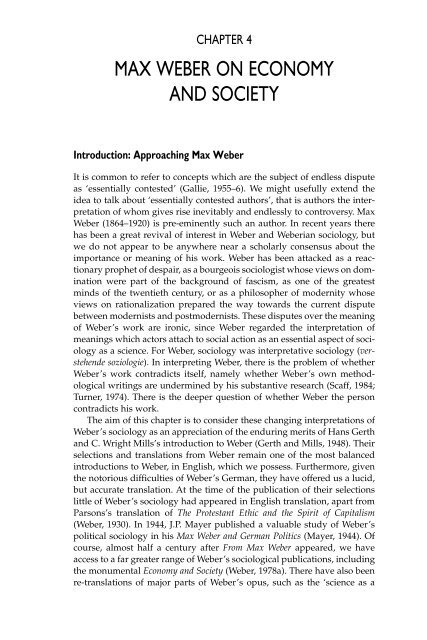You also want an ePaper? Increase the reach of your titles
YUMPU automatically turns print PDFs into web optimized ePapers that Google loves.
CHAPTER 4<br />
MAX WEBER ON ECONOMY<br />
AND SOCIETY<br />
Introduction: Approaching Max Weber<br />
It is common to refer to concepts which are the subject of endless dispute<br />
as ‘essentially contested’ (Gallie, 1955–6). We might usefully extend the<br />
idea to talk about ‘essentially contested authors’, that is authors the interpretation<br />
of whom gives rise inevitably and endlessly to controversy. Max<br />
Weber (1864–1920) is pre-eminently such an author. In recent years there<br />
has been a great revival of interest in Weber and Weberian sociology, but<br />
we do not appear to be anywhere near a scholarly consensus about the<br />
importance or meaning of his work. Weber has been attacked as a reactionary<br />
prophet of despair, as a bourgeois sociologist whose views on domination<br />
were part of the background of fascism, as one of the greatest<br />
minds of the twentieth century, or as a philosopher of modernity whose<br />
views on rationalization prepared the way towards the current dispute<br />
between modernists and postmodernists. These disputes over the meaning<br />
of Weber’s work are ironic, since Weber regarded the interpretation of<br />
meanings which actors attach to social action as an essential aspect of sociology<br />
as a science. For Weber, sociology was interpretative sociology (verstehende<br />
soziologie). In interpreting Weber, there is the problem of whether<br />
Weber’s work contradicts itself, namely whether Weber’s own methodological<br />
writings are undermined by his substantive research (Scaff, 1984;<br />
Turner, 1974). There is the deeper question of whether Weber the person<br />
contradicts his work.<br />
The aim of this chapter is to consider these changing interpretations of<br />
Weber’s sociology as an appreciation of the enduring merits of Hans Gerth<br />
and C. Wright Mills’s introduction to Weber (Gerth and Mills, 1948). Their<br />
selections and translations from Weber remain one of the most balanced<br />
introductions to Weber, in English, which we possess. Furthermore, given<br />
the notorious difficulties of Weber’s German, they have offered us a lucid,<br />
but accurate translation. At the time of the publication of their selections<br />
little of Weber’s sociology had appeared in English translation, apart from<br />
Parsons’s translation of The Protestant Ethic and the Spirit of Capitalism<br />
(Weber, 1930). In 1944, J.P. Mayer published a valuable study of Weber’s<br />
political sociology in his Max Weber and German Politics (Mayer, 1944). Of<br />
course, almost half a century after From Max Weber appeared, we have<br />
access to a far greater range of Weber’s sociological publications, including<br />
the monumental Economy and Society (Weber, 1978a). There have also been<br />
re-translations of major parts of Weber’s opus, such as the ‘science as a

















